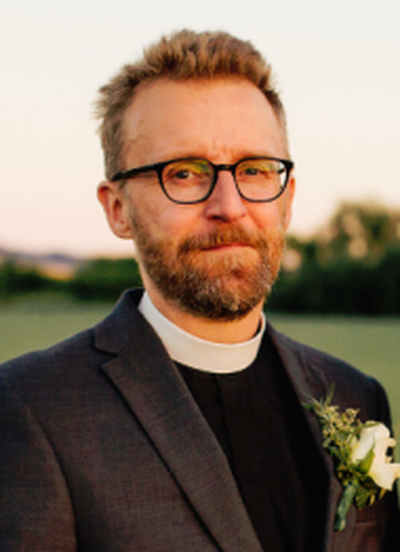This column reflects the opinion of the writer. Learn about the differences between a news story and an opinion column.
Faith and Values: The Christian wisdom of ‘Hitchhiker’s‘ command ‘Don’t panic’

These past few weeks at bedtime I’ve been reading Douglas Adams’ “The Hitchhiker’s Guide to the Galaxy” to our youngest child. “The Hitchhiker’s Guide” is one of the beloved books of my adolescence.
In a book full of memorable moments and ideas, one of the most memorable is the Hitchhiker’s Guide itself. The novel tells us that one of the reasons that the guide is so popular is that its front cover features these two words printed in bold font:
Don’t panic.
In a funny way, it was the moment when I encountered the words “Don’t panic” in this latest rereading that I began to wonder if Adams’ book just might be a spiritual classic.
Bear with me.
Adams’ novel is a work of comedy – sometimes a goofy comedy. And Adams self-identified as an atheist. But neither of those realities stop “The Hitchhiker’s Guide” from encountering some of the great questions of faith.
The book’s central character, Arthur Dent, is a person who, like Job, lives through cataclysmic, abrupt and arbitrary loss: The book begins with the destruction of the Earth and Dent’s narrow and wildly improbable escape onto a spaceship. Rereading “The Hitchhiker’s Guide” in middle age, I am struck by the enormity of Dent’s loss and by his wildly disorienting grief in a way that I was not when I was younger . And I am struck as well that the words Dent meets in his grief – Don’t panic – are a kind of variation on the famous and beloved assurance from Julian of Norwich:
“All shall be well, and all manner of thing shall be well.”
Now, Julian’s words are often quoted on their own. But they take on a deeper and more complicated meaning when we hear them in their greater context. Julian wrote them in response to one of the great and perplexing questions of life: Why does God allow suffering and evil?
Here are her fuller words:
“I often wondered why, by the great foreseeing wisdom of God, the onset of sin was not prevented: for then, I thought, all should have been well. This impulse (of thought) was much to be avoided, but nevertheless I mourned and sorrowed because of it, without reason and discretion.
But Jesus, who in this vision informed me of all that is needed by me, answered with these words and said: ‘It was necessary that there should be sin; but all shall be well, and all shall be well, and all manner of thing shall be well.’”
It was necessary that there should be sin.
Stop and think about that for a while.
Notwithstanding the presence of sin, notwithstanding its strange and awful necessity, notwithstanding cataclysmic, abrupt and arbitrary loss:
All shall be well.
It is the end of a hard year. It is the beginning of a new year that has already gotten off to a hard start. It may be hard to believe in or to heed Julian’s words. Perhaps they strike us as too facile, too easy. They certainly are simple. But I have this hunch, this holy guess, that they are not simplistic.
I have this hunch that they are telling us the truth.
Jesus knows all about pain, about loss, about unfairness, about absurdity, about injustice, about sin, about death. He knows as well that – somehow, in a way that we cannot fully explain or understand – these things are necessary. And he promises that, on the far side of all of these things, there awaits resurrection.
All shall be well, and all manner of thing shall be well.
Or, if you prefer:
Don’t panic.
Somehow, in spite of everything, it’s going to be OK.
The Rev. Martin Elfert served on the staff of the Episcopal Cathedral of St. John the Evangelist in Spokane from 2011-15. He is now the rector of Grace Memorial Episcopal Church in Portland.